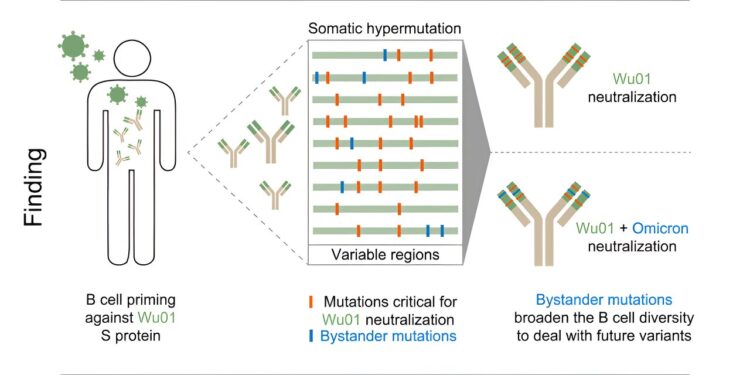Graphical summary. Credit: Immunity (2023). DOI: 10.1016/j.immuni.2023.11.004
Although SARS-CoV-2 is no longer a stranger to the immune system, new virus variants still pose a challenge. The working group led by Professor Dr. Florian Klein, Director of the Institute of Virology at the University Hospital Cologne and the Faculty of Medicine, has published two studies examining how the antibody response to SARS-CoV-2 evolves over time and how the immune system prepares for new variants through smart strategies.
The first paper, titled “Enhanced humoral immunity of SARS-CoV-2 following breakthrough infection relies on the pre-existing memory B cell pool,” is published in Scientific immunology. The second paper, titled “Somatic hypermutation introduces bystander mutations that prime SARS-CoV-2 antibodies for emerging variants” is published in Immunity.
In a process known as affinity maturation, antibodies can mature over time through the exchange (mutations) of individual amino acids, allowing them to better detect infectious pathogens. The working group led by Professor Klein has now been able to show that omicron infection induces a new immune response in vaccinated people, which is mainly based on the reactivation of so-called memory B cells.
It is interesting to note that the process of maturation of the antibodies produced by these cells had already taken place well before the emergence of the omicron: the immune system was therefore already prepared. The results of both studies show how much the first contact with SARS-CoV-2 influences the immune system and suggest the possibility that it is also prepared for future variants.
“Our first goal was to study how the antibody response in healthy subjects changes through a third vaccination against the original SARS-CoV-2 strain,” reports Svea Rose, doctoral student and first author.
“We were initially surprised by the results. Although the third vaccination overall significantly increased the immune response to SARS-CoV-2, there was hardly any further maturation at the level of individual antibodies. “
However, people who, like many, were infected with the BA.1 and BA.2 omicron variants after vaccination were also examined. The reanalysis showed that memory B cells, capable of forming SARS-CoV-2 omicron neutralizing antibodies, are now proliferating.
“Interestingly, immune cells against the omicron variant were already present before contact with the omicron and were not induced by the micron,” adds first author Dr. Timm Weber. But that’s not all: researchers discovered very early on so-called broad-spectrum neutralizing antibodies, capable of neutralizing all the new variants tested.
At the same time, the working group looked into the molecular mechanism of affinity maturation. Time was reversed and individual antibodies isolated worldwide during the first year of the pandemic were restored to their original state, report the two lead authors Michael Korenkov and Dr. Matthias Zehner in the published study In Immunity.
As a result, researchers were able to show that some changes during affinity maturation are not deliberate but occur randomly. Surprisingly, it was precisely these random modifications that were key to neutralizing omicron variants.
“The immune system expands the arsenal of existing antibodies by inserting arbitrary mutations and thus increases the probability of having a suitable antibody in the repertoire when a new variant of the virus appears,” explains Dr. Christoph Kreer, who led the study with Professor Klein. The group was able to use the new biological findings to modify an ineffective therapeutic antibody against omicron so that it could again effectively neutralize omicron variants.
In summary, the work shows how the human immune system responds to a new virus and its emerging variants. The newly isolated broad neutralizing antibodies are so effective that they could also be used therapeutically and preventatively against new omicron variants.
More information:
Timm Weber et al, Enhanced humoral immunity of SARS-CoV-2 following breakthrough infection relies on the pre-existing memory B cell pool, Scientific immunology (2023). DOI: 10.1126/sciimmunol.adk5845
Michael Korenkov et al, Somatic hypermutation introduces bystander mutations that prime SARS-CoV-2 antibodies for emerging variants, Immunity (2023). DOI: 10.1016/j.immuni.2023.11.004
Provided by the University of Cologne
Quote: How first contact influences the immune response to new variants of SARS-CoV-2 (December 7, 2023) retrieved December 7, 2023 from
This document is subject to copyright. Apart from fair use for private study or research purposes, no part may be reproduced without written permission. The content is provided for information only.



